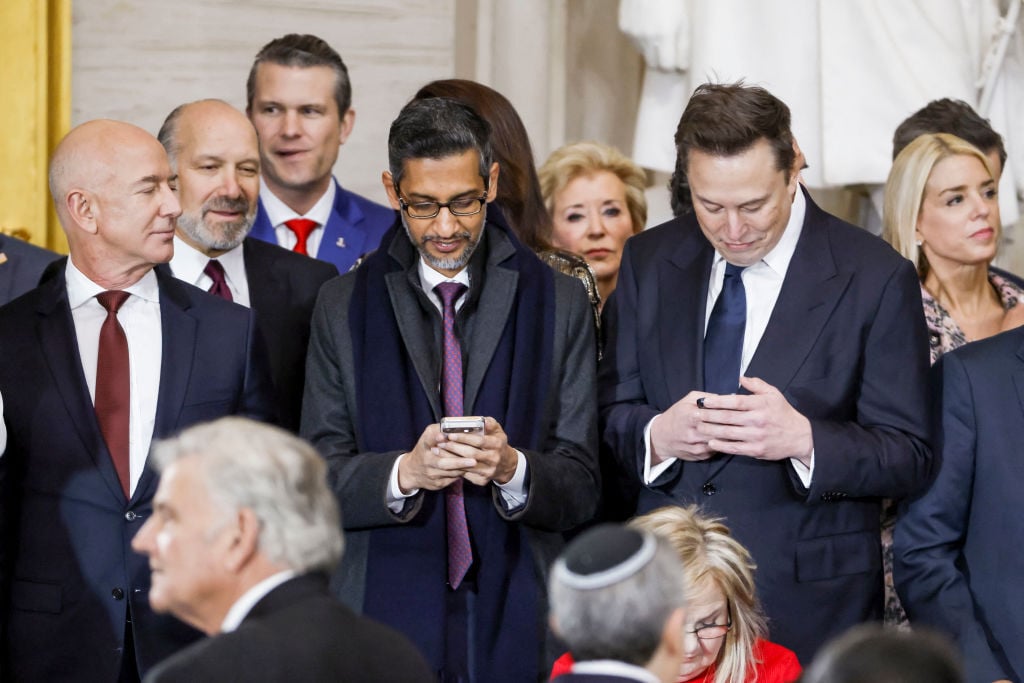
Check out our latest products
President Trump’s controversial “Big Beautiful Bill” proposes a widespread AI-ification of the federal government, with billions in fresh funding for it. But one of his biggest supporters, Elon Musk, took to his social network today to slam the ‘pork-filled’ bill and the Republicans who voted for it.
H.R. 1, which is actually called the One Big Beautiful Bill Act, contains about a dozen AI initiatives, some of which have specific budgets, listed in the table below. Some descriptions are vague, like $250 million “for the advancement of the artificial intelligence ecosystem” at the Defense Department. But the major proposals involving the tech are “reducing and recouping improper payments under Medicare,” developing new capabilities at DoD, modernizing federal IT systems, and combatting the entry of narcotics across the border.
A ‘Disgusting Abomination’
Elon Musk, who appears to be on an image-rehab tour after running roughshod over the federal government for months, does not support the bill. Prior to formally stepping down from DOGE, he told CBS News that he’s “disappointed” because it increases the federal deficit substantially through tax cuts and other measures and “undermines” the work of the Department of Government Efficiency (DOGE), he says.
“I think a bill can be big or it can be beautiful,” Musk said at the time. “I don’t know if it can be both. My personal opinion.”
This week, with DOGE in the rearview, Musk ramped up his attacks on the bill. “I’m sorry, but I just can’t stand it anymore,” he tweeted on Tuesday. “This massive, outrageous, pork-filled Congressional spending bill is a disgusting abomination. Shame on those who voted for it: you know you did wrong. You know it.”
This Tweet is currently unavailable. It might be loading or has been removed.
Musk continued with a follow-up post that warned the bill “will massively increase the already gigantic budget deficit to $2.5 trillion (!!!) and burden America citizens with crushingly unsustainable debt.”
The Congressional Budget Office (CBO) estimates that the bill would increase the federal deficit by $3.8 trillion due to the tax cuts.
Musk, who donated $288 million to elect Trump, later re-tweeted a post calling out the GOP for spending money on luxury hotels, “not voting on any DOGE cuts,” and “spending 60% of their time on vacation.” He also vowed to “fire all politicians who betrayed the American people” in November elections.
Still, Musk’s xAI and rivals like Google, Microsoft, and OpenAI stand to benefit if they secure any of these federal AI dollars. One section of the bill, for example, calls on the government “to contract with a vendor of artificial intelligence tools and with data scientists” to implement tools that would help catch “improper” Medicare payments.
Another section calls for $500 million through 2035 to modernize federal IT systems, in part by deploying “commercial artificial intelligence.”
DOGE is already experimenting with AI tools. In March, it deployed an in-house AI chatbot and API at the General Services Administration. The FDA is also deploying Elsa, an LLM that “can summarize adverse events to support safety profile assessments, perform faster label comparisons, and generate code to help develop databases for nonclinical applications.”
10-Year Ban on AI Regulation
Jeff Bezos, Sundar Pichai, and Elon Musk at Trump’s inauguration. (Photo by SHAWN THEW/POOL/AFP via Getty Images)
If you asked yourself why Silicon Valley CEOs would hand over millions for President Trump’s inauguration and sit behind him as he took the oath of office, look no further than a provision in this bill that proposes a 10-year moratorium on state-level AI regulation.
Get Our Best Stories!

Your Daily Dose of Our Top Tech News
By clicking Sign Me Up, you confirm you are 16+ and agree to our Terms of Use and Privacy Policy.
Thanks for signing up!
Your subscription has been confirmed. Keep an eye on your inbox!
As it’s written, the bill says that no “state or political subdivision” may “enforce any law…regulating artificial intelligence models, artificial intelligence systems, or automated decision systems during the 10-year period beginning on the date of the enactment of this Act.”
The goal is to “remove legal impediments” and “facilitate the deployment” of AI. It aims to “streamline licensing, permitting, routing, zoning, procurement, or reporting procedures,” and make sure regulation does not require AI models to have specific design, performance, or data requirements.
Forty-eight states and Puerto Rico have introduced AI-related legislation, with 26 states adopting or enacting 75 new measures, according to the National Conference of State Legislatures. For example, North Dakota passed a law prohibiting the use of AI-powered robots for stalking and harassment. Arkansas passed a measure protecting copyright law.
In California, Gov. Gavin Newsom vetoed a bill that would have required large companies to “perform basic safety testing on massively powerful AI models.” Focusing on companies that have reached a certain size (many of which are based in the Golden States) could stifle innovation while leaving the threats presented by smaller models unaddressed, he said at the time. Newsom has been more open to security-related AI bills, one of which prompted a lawsuit from Musk.
Jake Karr, Acting Director of the Technology Law & Policy Clinic at NYU’s School of Law, tells the nonprofit Tech Policy Press that the moratorium is “overbroad and vague.” He concedes that “much of the state-level tech legislation over the past few years has been rash and misguided,” but argues that the feds “should not get in the way of states earnestly trying to make sense of emerging technologies and protect their residents.”
Matthew U. Scherer, senior policy counsel at the Center for Democracy & Technology, has a more dire warning: “The moratorium is so sweeping that it’s hard to imagine how any law that touches on AI or automated decision-making in any way could escape it.”
Republicans argue that a patchwork of state-level AI laws are hard for tech companies to navigate, particularly startups with limited resources.
“Imagine how difficult it would be for a federal agency that operates in all 50 states to have to navigate this labyrinth of regulation when we potentially have 50 different states going 50 different directions on the topic of AI regulation,” Rep. Jay Obernolte, a California Republican, said at a recent hearing, according to The Hill. “This is exactly the same circumstances that we are putting private industry in as they attempt to deploy AI.”
What’s Next for the ‘Big, Beautiful Bill’?
The House approved H.R. 1 on May 22 by a vote of 215-214. Two deficit-conscious Republicans joined Democrats in opposing the bill. It now moves to the Senate, where it faces an uphill battle, particularly among moderate Republicans concerned about Medicaid cuts.
The effort may also run into some procedural hiccups. Sen. John Cornyn, a Texas Republican, tells the AP that the AI moratorium may run afoul of the Byrd Rule, which holds that budget reconciliation bills should be focused on funding allocations, not specific policies.
Any big changes made by the Senate would then need to be reconsidered by the House before it’s sent to Trump for his signature. Last week, amid Musk’s pushback, Trump noted that the bill has “got a way to go.”
About Emily Forlini
Senior Reporter

Read the latest from Emily Forlini

![[K-Beauty] Rose Vitamin Oil to Foam | Daily Face Wash Oil Based Cleanser | Korean Rose Oil Foaming Face Cleanser | Hydrating Facial Cleanser for Dry Sensitive Skin (3.88 oz)](https://i1.wp.com/m.media-amazon.com/images/I/71sX7yIuXRL._SL1500_.jpg?w=300&resize=300,300&ssl=1)





![[ 8 Pack ] Plastic Storage Baskets With Lids, Small Pantry Organization, Stackable Storage Bins, Household Organizers for Cabinets, Countertop, Drawers, Under Sink or On Shelves,Gray](https://i1.wp.com/m.media-amazon.com/images/I/81NMRFDwXYL._AC_SL1500_.jpg?w=300&resize=300,300&ssl=1)
![[Luxury] Kitchen Soap Dispenser Set – 16OZ Black Glass Bottle, Stainless Steel Pump, Instant Dry Tray, Waterproof Labels, Non-Slip Silicone Pad, and Dish Brush | Upgrade for Your Kitchen and Bathroom](https://i3.wp.com/m.media-amazon.com/images/I/71TQcJWiGtL._AC_SL1500_.jpg?w=300&resize=300,300&ssl=1)





